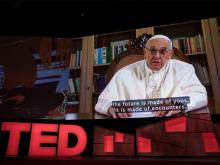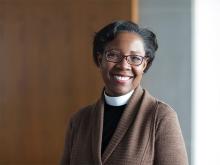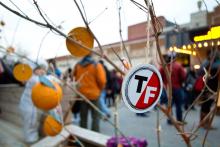Social Justice

The city of Antioch — in modern-day Turkey — was beautiful and bustling in the fourth century. Various emperors and wealthy patrons donated money to build a colonnaded street through the middle of town. Well-to-do citizens decorated their marble halls with colorful frescoes and statues. They demonstrated their wealth by plating their walls and rooftops with gold. Even the city’s cathedral was called the “Golden House.” It would eventually seat a Patriarch, John, nicknamed “Chrysostom” or “Golden Mouth.”

This is why the civil rights movement was so impactful. The movement for justice was fueled and sustained by faith. The soul was not considered something separate from the body it was the source, the epicenter, and the driver for non-violent resistance and hope-filled resilience. Dr. King called this soulful way of doing justice “soul force.” Soul force heals the misguided bifurcation between evangelism and social justice by showing the deep connection between our souls and our actions. We must recover the soul of justice, lest we end up cynical, burned out, and reactionary. Soul work sustains both individuals and communities in our justice work. We must not neglect our souls in the work for justice nor neglect justice to tend to our souls. We must commit to both lifestyles and collectives that demand soul care as a non-negotiable act of justice for all.

"We believe that this pardon does not contribute to the process of national reconciliation because it turns its back on the victims and because it is the product of apparent pact of impunity. We believe that without sincere repentance and without meeting the expectation of justice and reparation for those whose rights were trampled an authentic reconciliation cannot exist and cannot be achieved."

While casting our troubles onto God is a critical aspect of our faith, I fear that we often interpret burden as one-directional, particularly with how we react to social injustice. These days, it is hard to miss the consistent threat to human rights on multiple levels, but it is still possible to avoid responding to them. Particularly during the past year, I have heard so many colleagues verbalize their decisions to avoid watching or reading the news because it’s too distressing. Furthermore, common responses from Christian colleagues to my (admitted) rants about the world’s concerning state include “It’s not of God to worry,” and “All of this is a part of God’s master plan.” The feedback that strikes and disturbs me most is when I hear that we should ultimately go to God to comfort our distress over the world’s injustice, often insinuating self-soothing over action.

Victims of trafficking get 45 days of what the government calls “recovery and reflection,” and care is offered via the Salvation Army. But traumatized, destitute people need far more than help for just six weeks, Archer discovered. This is where her parish came in.

More than 60 years ago, the divinity school denied him admission because he is black. Speaking at a service in Goodson Chapel, he asked: “What is it that God would have Duke Divinity School do in light of that history? For if one is not honest about that history, one can’t be fully present.”

Though politically important during key periods of American history, evangelicals on the left have lost much of the influence they wielded as abolitionists or as advocates for safe working conditions during the 19th century. The history of progressive evangelicals has been full of disappointments, notably declining as the “religious right” rose to prominence in the 1980s. These years ensured that in common parlance, “evangelical” is now a synonym for “conservative.” The continuing dominance of the “moral majority,” and the current nature of partisan politics in the U.S., ensures that Christians who are concerned about social justice issues are minimized in national debates.

In recognizing the challenges of working for social justice, spiritually-rooted social action provides something of substance to the people in movements. From this place of rootedness, social movements can set intentions that point towards sustainability.

The talk — a surprise for all in the audience — recapitulated the key themes of the Argentinian pope’s view of the human person: We are all related and interconnected; scientific and technological progress must not be disconnected from social justice and care for the neighbor; and that the world needs tenderness.
I am a scholar of modern Catholicism and its relations with the world of today. From my perspective, there are two essential elements of this talk that are important to understand: the message of the pope and his use of the media.

To tell a Christian story about environmental care, we must redefine Christian stewardship. For a movement to attach Christ’s name to it, it must embody the spirit of Jesus as one who gave away his power. Christian stewardship, then, is not dominating with power, but yielding with care. First, we must listen to what the natural world is telling us and respond to it accordingly, not only because we ought to be tenderhearted people, but because it ensures our mutual flourishing

On April 10, Columbia University presented 21 Pulitzer Prizes for achievements in journalism, literature, and music. Notables from the list of social justice-oriented works that received a Pulitzer Prize include: New York Daily News and ProPublica receiving the Public Service award for reporting on evictions of mostly poor minorities carried out by police abusing the law —

Unplugging from social media or limiting one’s internet use for a set period such as during Lent can be helpful for some individuals. My research, conducted over two decades, however, shows that some core assumptions on which digital fasting is based can be problematic or misguided.

On Jan. 21, I’ll join thousands in D.C. for the Women’s March on Washington. My first stop will be at a local congregation, one of several hosting a prayer service and warming station for marchers. I’m an anti-racist, feminist, Christian, and for me, faith will be part of the day.
I’ve been disappointed with Christian silence, and even active resistance, to social justice imperatives, but my commitments to justice stem from my faith, and that’s why I march.

The Episcopal Diocese of Indianapolis has elected the first black, female diocesan bishop in the history of the Episcopal Church.
The Rev. Jennifer Baskerville-Burrows, director of networking in the Episcopal Diocese of Chicago, was elected on the second ballot, during a diocesan convention held at Christ Church Cathedral Indianapolis on Oct. 28.

How can salvation be believed when we refuse to save refugees, or hope grasped when we deny it to immigrants, or justice pursued when we refuse it to the oppressed, or faith accepted when we don’t have faith in those different from us, or love known when we deny it to our neighbors, strangers, and even our enemies?

In this new tale, Harry is a little bored, a little uninspired, and a little wistful for the good old days. A decade or so into my own adulthood and a few difficult years into ministry, advocacy, and activism, I have also struggled a bit with the transition from childhood adventure to the mature, painstaking reality of real work of justice.

As we strive for social justice and attempt to love our neighbors, are we relying on Christ, or are we relying on the military, political leaders, the government, church authorities, institutions, and abusive ideologies?
Are we motivated and inspired by the love of Jesus, or are we driven by fear, judgment, hate, jealousy, envy, wealth, fame, recognition, and an appetite for power?

The True/False film festival in Columbia, Mo., likes to bill itself as “different.” And it is — the intimate weekend-long documentary fest has a well-earned reputation as a place where anything can happen: Here you’ll find award-winning directors hobnobbing with writers and college students over brunch, and accountants and lawyers who transform themselves, Cinderella-style, into flamboyantly dressed volunteers. But Columbia’s festival is unique in another way, one that’s more important than simple aesthetics: True/False also focuses on the unifying power of story.
Over its 13 years of existence, the festival has been committed to promoting the idea that introducing audiences to stories wildly different from their own expands our understanding of the human experience.

Sojourners founder and president Jim Wallis appeared Nov. 7 on the Drew Marshall Show, a spiritual talk show that broadcasts on radio stations all over Canada. In the interview, Rev. Wallis discussed a range of topics from baseball and his love of coaching his sons, to Sojourners’ push for immigration reform, Pope Francis’ recent visit, and his upcoming book America’s Original Sin: Racism, White Privilege, and the Bridge to a New America.
Rev. Wallis also talked about his faith journey, from his experience at a revival as a child, to his leaving his home church to join the student movements in the 1960s and 1970s. He discussed the encounter with an elder in his church where an elder said that they had “nothing to do with racism. That’s political. Our faith is private.”
This exchange, Wallis noted, is what led him to eventually leave his church, only to come back to his faith after reading in Matthew 25 about how followers of Christ should treat the “least of these,” and what leads him to say that “Faith is always personal, but never private.”

Though some critics have claimed that the film doesn’t do enough to show the effects of the suffrage movement, it seems appropriate that Suffragette ends while the fight is still going on. In the era of Black Lives Matter, battles for reproductive rights and immigration reform — causes with hoped-for but still undetermined outcomes — it’s reassuring the see a film that portrays historical characters in a similar situation. The women of Suffragette are confident in their eventual victory not because they know what will happen. They’re confident because they have to be — because for them, allowing defeat was not an option.